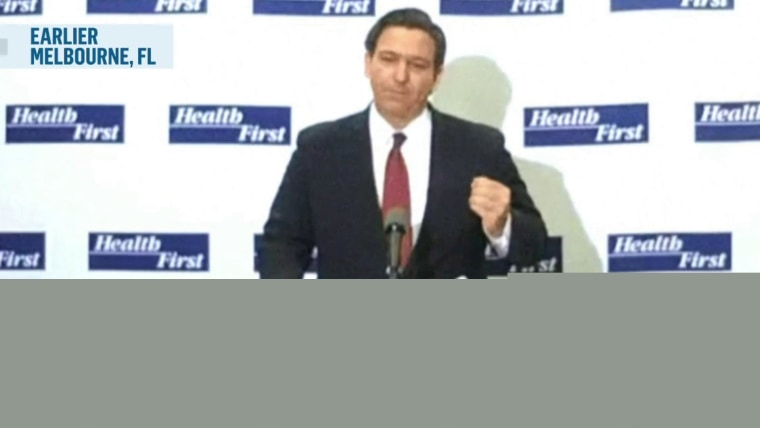Perhaps if President Donald Trump had acted sooner to issue social distancing guidelines, he would be on track to accept the renomination of his party from an adoring crowd in either Charlotte, North Carolina, or Jacksonville, Florida, this summer.
Maybe if he had not pushed state and local officials to reopen commerce while the coronavirus was still spreading slowly across the country, he would be heading into that celebration as a favorite to win a second term.
But the president, newly eager to signal that he is living in reality, acknowledged Thursday what had become increasingly evident about the Republican National Convention: There was no way — logistically or politically — that he could launch his fall campaign from an arena in the heart of a state struggling to combat the pandemic.
“I looked at my team, and I said: ‘The timing for this event is not right. It’s just not right with what’s happened recently — the flare-up in Florida — to have a big convention. It’s not the right time,'” Trump said.
He attributed his decision to his magnanimity.
“It’s really something that, for me — I have to protect the American people,” he said. “That’s what I’ve always done. That’s what I always will do. That’s what I’m about.”
But last month, when he held a rally in an arena in Tulsa, Oklahoma, his best judgment for safeguarding the health of his boosters didn’t preclude him from trying to pack them into an arena to hear him speak. Now, though, it does. Since then, the self-inflicted political damage he’s incurred by playing down the threat of the coronavirus while it continues to kill Americans has become evident in polling.
That is, whatever he thinks about the health threat, his political self-interest in showing sensitivity to the danger is clear.
That’s just one of several reasons he had no choice but to give Jacksonville the axe.
He has made an abrupt U-turn in his treatment of the disease as a public health risk as he has watched his credibility with the public slide amid spikes in infections, hospitalizations and fatalities. He once said the American death toll might be limited to 50,000 or 60,000 people as he bristled at the economic damage of the commercial shutdowns. The death toll now stands at more than 144,000.
For months, Trump declined to wear a mask. This week, he pulled one out of his jacket pocket at a press briefing at the White House to display it for cameras, and he has encouraged Americans to wear face coverings in public.
The press briefings themselves are the most dramatic reversal for Trump, who held them on a daily basis for weeks, then stopped to draw attention away from the pandemic, and now has resumed them — without the assistance of medical professionals who might contradict him — in a show of the attention he is giving to the national crisis.
It would have been a jarring contrast for him to tell the public that he was taking the threat of the coronavirus seriously — to recommend safe behavior — and then conduct another campaign rally, in a state where a one-day record of 173 deaths was reported Thursday.
“President Trump is focused on leading the American people during this unprecedented crisis, and his number one priority in this decision was the safety of the people of Jacksonville, the convention attendees, and all of the American people,” Republican National Committee Chairwoman Ronna McDaniel said in a tweet Thursday.
That, of course, raises the question of why the president held a rally in Tulsa last month and continued with the planning for the Jacksonville portion of the GOP convention while thousands of Americans died of the disease.
The obvious answer is that he didn’t grasp that he was paying a heavy political price until recently.
“The president has decided that he’s losing more of his base than he’s gaining with his approach to COVID,” Republican donor Dan Eberhart said in a text message. “He is realizing that he has to change course. It was probably inevitable that events in Jacksonville were going to be canceled. The president was right to make it his call and put a plug in the criticism.”
The second reason Trump had to call off his own convention coronation is that it might have been an embarrassment along the lines of his underattended Tulsa rally.
Jacksonville Mayor Lenny Curry, a Republican, sounded an alarm this week, telling reporters that his city wasn’t prepared for the security needs of the four-day convention in late August and that he didn’t expect to see the $100 million boon that he had once predicted.
“It’s clear it will not be that kind of economic activity with the scale-back,” he said.
It’s not that no one wants to go to a convention to cheer Trump on. It’s just that the number of people willing to risk their safety to do it is limited.
Finally, Trump had to bag the convention because his best bet to regain traction and win re-election is to use the advantage of the White House.
While crisis can lock a president into a doleful Rose Garden strategy, the White House still provides the best platform for marrying national interests and political self-interest. In theory, the properly understood self-interest of a president seeking re-election and the public interest should seldom be at odds.
Canning the convention was always a no-brainer from a public health perspective. And, as Trump seems to be slowly, stubbornly and reluctantly accepting, the politics of the coronavirus are tightly tied to the threats it poses to his fellow Americans.












